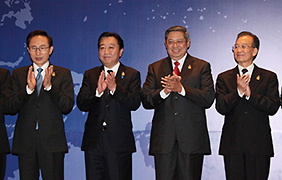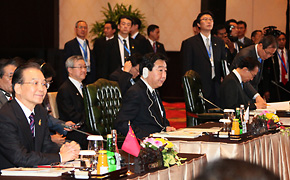14th ASEAN+3 Summit Meeting (Overview)
November 18, 2011

Group photograph before the ASEAN+3 Summit Meeting
Photograph of the ASEAN+3 Summit Meeting
(Photos: Cabinet Public Relations Office)
The 14th ASEAN Plus Three Summit Meeting took place at the Bali Nusa Dua Convention Center in Bali, the Republic of Indonesia on November 18. Representing Japan was Prime Minister Yoshihiko Noda. The following is a summary of the meeting (chaired by Indonesian President Susilo Bambang Yudhoyono):
1. Review of ASEAN+3 Cooperation and Future Course
- (1) At the outset of the meeting, Prime Minister Noda expressed his deep sympathy for flood disasters in Thailand, Cambodia, Myanmar, Vietnam and Laos, and typhoon damage in the Philippines. He conveyed Japan's policy of continuing to provide as much assistance as possible and voiced his wish for the earliest recovery and reconstruction of the disaster-stricken countries.
- (2) Prime Minister Noda noted that the ASEAN+3 cooperation, which started in the financial field, had now expanded to many other spheres, such as food security, disaster management, education and transnational crime, and had thus been crowned with signal success as a practical framework of regional cooperation. In this context, he referred to the specific examples of cooperation as follows:
-
(a) Food Security
Prime Minister Noda lauded the signing of the ASEAN Plus Three Emergency Rice Reserve (APTERR) agreement, designed to set up a rice reserve system for emergency assistance, and expressed his hope for an early entry into force of the agreement. He also referred to Japan's assistance of 50,000 dollars extended for the procurement of rice and other food in response to the flood disasters in the Mekong River basin as a preparatory project prior to the effectuation of the APTERR agreement. He said Japan was providing extensive agricultural assistance ranging from production to distribution, including help for the ASEAN Food Security Information System (AFSIS), expressing Japan's intention to continue contributing to reinforcing food security in East Asia.
-
(b) Financial Cooperation
Prime Minister Noda welcomed the establishment in April this year of the ASEAN+3 Macroeconomic and Research Office (AMRO) designed to closely watch and analyze the regional economy. He referred to the importance of the ongoing study on crisis prevention for the purpose of sustainable regional economic development and financial stability at this juncture when the global economic and financial environments remained unstable.
-
(c) Cooperation for Disaster Management
Prime Minister Noda said Japan would like to share its experiences and lessons-learnt from the Great East Japan Earthquake with the international community and thereby contribute to building a more disaster-resilient region. He invited the countries to take part in an international conference on major natural disasters to be hosted by Japan next year.
-
(d) Education
Prime Minister Noda welcomed the progress of cooperation in education and noted that Japan would like to play a leading role in guaranteeing the quality of higher education. He pointed out that Japan hosted "The International Symposium on Exchange among Universities with Quality Assurance in East Asia" in Tokyo in September this year with notable success. He also observed that Japan, the People's Republic of China and the Republic of Korea (ROK) were pushing ahead with the "Campus Asia" project, and that they would like to share the fruits of the project with ASEAN and deepen discussions on the matter.
-
(e) Economy and Trade
As for the East Asia Free Trade Area (EAFTA) and Comprehensive Economic Partnership in East Asia (CEPEA), Prime Minister Noda referred to a Japan-China joint proposal for the establishment of new working groups for EAFTA and CEPEA. He referred to his expectations that the discussions on the liberalization of trade and investment in East Asia should be accelerated through the early establishment of the new working groups.
-
(f) Transnational Crime
Prime Minister Noda said Japan also attached importance to cooperation in fighting against international crime because the elimination of such negative factors as terrorism was also essential for reinforcing intraregional connectivity. He noted that in July this year, Japan held a "Seminar on Aviation Security" within the framework of ASEAN+3 to enhance the capability to combat transnational crimes such as hijacking. He added that Japan would continue to implement specific cooperation in countering transnational crime.
-
(g) Cooperation for Tourism Promotion
Noting that the promotion of tourism is indispensable for the economic growth of all countries, Prime Minister Noda said Japan also placed importance on tourism for reconstruction after the earthquake disaster. He referred to Memorandum of Cooperation on the promotion of tourism to be signed in January next year and appreciated Indonesia's initiative in this context.
-
(h) East Asia Vision Group II (EAVGII)
Prime Minister Noda referred to the East Asia Vision Group II (EAVGII) which, comprising intellectuals of each country, was inaugurated in October this year with the aim of exploring how best to chart the course of future cooperation in the framework of ASEAN+3. He expressed appreciation for the ROK's initiative in this regard.
-
- (3) Lastly, Prime Minister Noda expressed great pleasure in the exchange of significant views regarding cooperation in diverse fields, including food security and financial cooperation, and said Japan would like to continue to promote practical regional cooperation within the framework with an eye to next year's commemorative Summit Meeting to be held on the occasion of the 15th anniversary of ASEAN+3 cooperation.
2. Regional and International Situations
Regarding the North Korean situation, Prime Minister Noda welcomed the recent inter-Korean and U.S.-North Korea dialogues and China's efforts for the resolution of North Korea's nuclear issue through the Six-Party Talks. On the other hand, he noted that North Korea's concrete actions that Japan, the United States and the ROK had demanded toward its denuclearization have yet to be seen, and that it was important to continue to strongly urge North Korea to make a decision to take such actions.
Prime Minister Noda pointed out that North Korea's proliferation activities were a destabilizing factor for both the regional and international society as a whole. He stated that it was important for all countries to steadily implement measures such as export control based on the relevant U.N. Security Council resolutions.
3. Outline of Remarks by ASEAN+3 Countries
- (1) Member countries touched on the necessity of seeing that East Asia would not be affected by the economic and financial unrest in Europe as typified by the eurozone crisis. They said it was important to ensure steady progress of the Chiang Mai Initiative multilateralization through relevant efforts such as establishment of the ASEAN+3 Macroeconomic and Research Office (AMRO).
- (2) Many countries pointed to the need to improve the capability to cope with natural disasters and set up systems for rescue activities and supply of relief goods in the event of disasters because the East Asian region is susceptible to them. In this sense, they welcomed the signing of the APTERR agreement for the establishment of a rice reserve system.
- (3) Participating countries expressed their gratitude to Japan, China and the ROK for their support of efforts to strengthen ASEAN connectivity and voiced their hope for continued assistance.
- (4) Many countries expressed their resolve to implement appropriate cooperation, considering next year's memorable 15th anniversary of ASEAN+3 cooperation.
Back to Index
